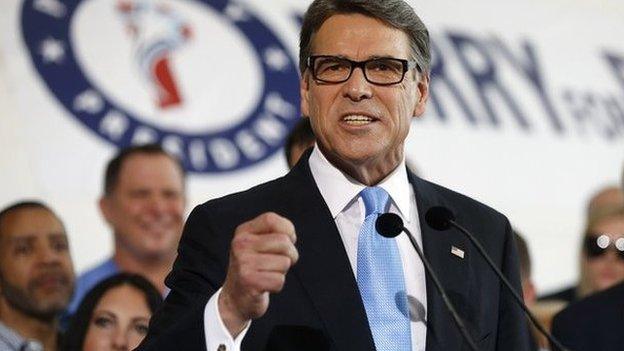Rick Perry: Texan twang in 2016 Republican nomination battle
- Published
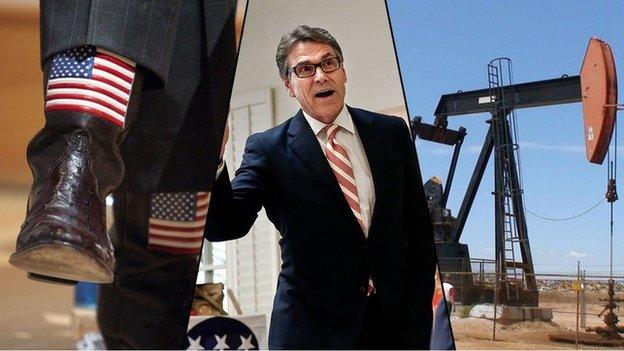
It's been seven years since George W Bush and his fellow Texans left the US political stage, but that doesn't mean the Lone Star State is out of the presidential game. If anything, the 2016 Republican nomination battle will have an even more distinct - if unexpected - Texas twang.
Visitors to the George W Bush Presidential Library in Dallas, Texas are greeted with a quote from the former president shortly after entering the main exhibit hall.
"My background leaves more than an accent, it leaves an outlook," reads an inscription on the wall. "Optimistic. Impatient with pretence. Confident that people can chart their own course."
For many the former president is the embodiment of the Texas political stereotype. Plain-spoken, frontier-style conservatism leavened heavily with the rhetoric of self-reliance and a swagger that borders on arrogance ("In Texas we call that walking," Mr Bush once famously said).
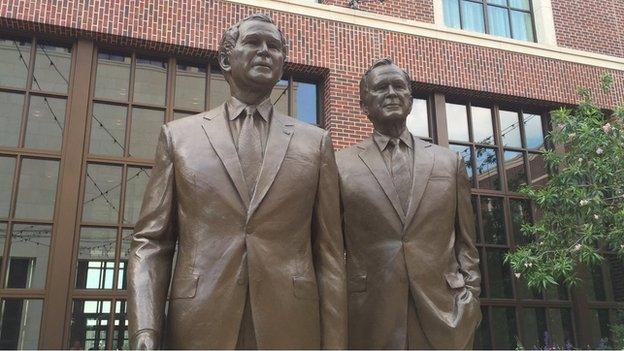
But there's more to modern Texas politics, made clear by the diverse range of candidates with strong state ties currently vying for the Republican presidential nomination.
"There is something about our personalities - we are very colourful people, and we tend to get attention put on us," says Abby Livingston of the Texas Tribune. "So there are no shortage of characters from the state of Texas who elicit national attention."
If Texas is the beating heart of the Republican Party, however, that cast of characters is pulling it in different directions - a reflection of the battle over the very identity of modern conservatism in the US.
Among the candidates, Rick Perry, who announced his presidential bid on Thursday, probably looks and sounds the most like the cowboy hat-wearing Texan of Hollywood central casting. He took over the governorship when Mr Bush became president in 2001 and held the office for a record-setting 14 years.
Unlike his predecessor, however, the fifth-generation Texan is no "compassionate conservative". His stump speech boasts of his state's long record of economic growth combined with tough talk on foreign policy.
Call him the flag-waving, tax-cutting conservative.
Next is Texas Senator Ted Cruz, the darling of the grass-roots Tea Party base that has roiled the Republican party over the past few years.
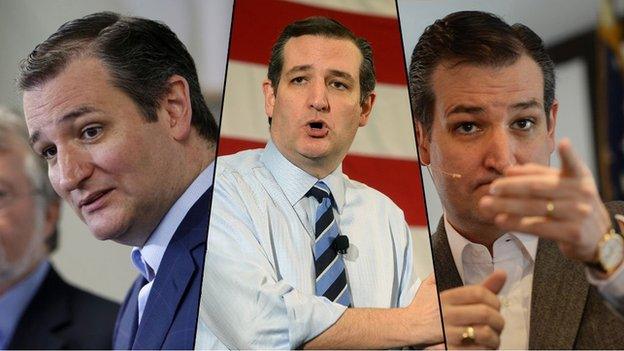
The Ivy League educated son of a Cuban immigrant rose to power by besting his party's establishment pick for the Senate, and he's made a name for himself with an aggressive embrace of conservative orthodoxy.
He represents the insurgent, uncompromising Republican, who views moderation even in his own party as a lack of moral strength.
"Since he became a senator, every single officeholder in the state is looking over their shoulder wondering if the next Ted Cruz is running against them in a Republican primary," Livingston says. "He has terrified everyone."
Although Senator Rand Paul hails from Kentucky, he's the son of former Texas Congressman Ron Paul, was raised in the Houston area and went to college at Baylor University in Waco.
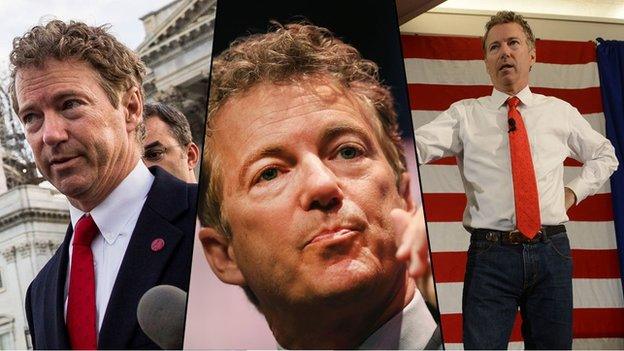
Like Mr Cruz, he's made his name railing against the Republican establishment - but his embrace of small government, civil liberties and a more modest foreign policy is a world away from his fellow senator's fire-and-brimstone politics.
The Kentucky senator is the libertarian conservative.
And then there's Jeb Bush.
Much has been made of the pending Sunshine State showdown between Florida's former governor and one of its current senators, Marco Rubio. But Mr Bush is just as much a part of the battle over Texan hearts, souls and pocketbooks as any - and his ties run deep.
Mr Bush was born in the oil town of Midland, went to college at the University of Texas and worked in Houston. Both his father and presidential brother call Texas home, and his son, George P Bush, is the state's land commissioner.
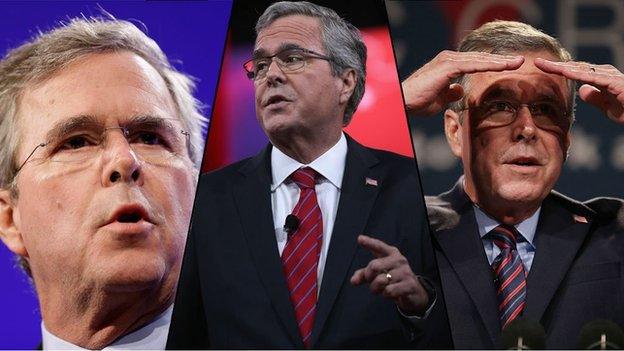
Label him what you will - the establishment conservative, the dynasty conservative - Mr Bush harkens back to the kind of Republican who used to firmly control Texas. He's pro-business and pro-immigration, with less interest in divisive social issues.
If you want to cast an even broader Texas net, that's not all.
Former Hewlett Packard head Carly Fiorina was born in Austin and still has family in Texas. While her natural base is the Silicon Valley of California, Texas has a vibrant high-tech industry with its own issues and interests in the conservative movement - including a heavy emphasis on science education, low taxes and regulation, and a steady supply of immigration visas for skilled workers.

And Mike Huckabee, former governor of neighbouring Arkansas, spent two years studying in a Fort Worth seminary. He's the evangelical conservative that has long made uneasy peace with the party's pro-business faction.
So what is it about Texas that has made it such a key player in this year's presidential race? Is it merely happenstance, combined with the state's population and wealth? Perhaps. But other large states, such as California, don't seem to consistently produce presidential aspirants the way the Lone Star State has.
"Texas is a pretty big part of the conversation by virtue of just how conservative the state is, just how much money is here and just how big it is," says James Henson, director of the Texas Politics Project at the University of Texas. "It's hard for people not to look at Texas and see something of a model or at least a laboratory of some sorts."
More than that, however, Livingston says Texas politics creates ties that bind. She points, for instance, to a friend of Rand Paul's dating back to the 1970s who stepped down as head of the Texas Republican Party in January, external to work for his campaign.
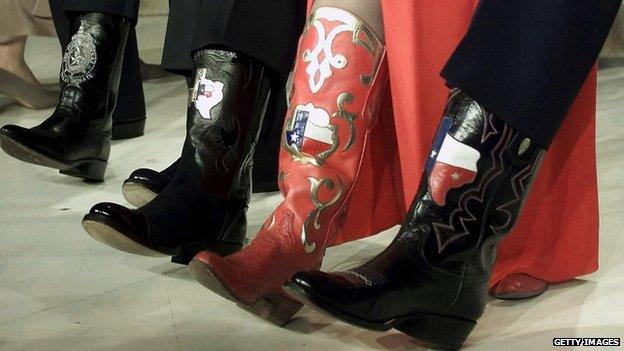
Inaugural cowboy boots of (l-r) George W Bush, Rick Perry, Texas Senators Kay Bailey Hutchinson and Phil Graham
"If you're just around in Texas long enough, you're going to meet people who will help you be successful - donors, political talent, that kind of thing," she says. "It's such a pivotal place in the Republican world that just having ties, being from here, living here - you're going to have some advantages."
Even on the Democratic side, candidates can't ignore Texas. At the same time Mr Perry was preparing to launch his candidacy in Dallas, former Secretary of State Hillary Clinton was swinging through the city, external for a $2,700 (£1,750) per person fundraising dinner.
Her state ties go back to 1972, when she and her husband worked in Austin on George McGovern's presidential campaign.
Texas's influence - on Republican politics, at least - is more than just a discussion of dollars and ideology, however. The state's primary is scheduled for 1 March - relatively early in the nomination calendar. According to Henson, that's going to encourage a lot of candidates to try to land a share of the state Richard Nixon once called "the big enchilada".
"If you're somebody from Texas, you really try everything you can do to stay in until that date, if only to get some delegates to bargain with," he says. "It's an expensive proposition, but if you run a campaign on the cheap it makes sense to hang around."
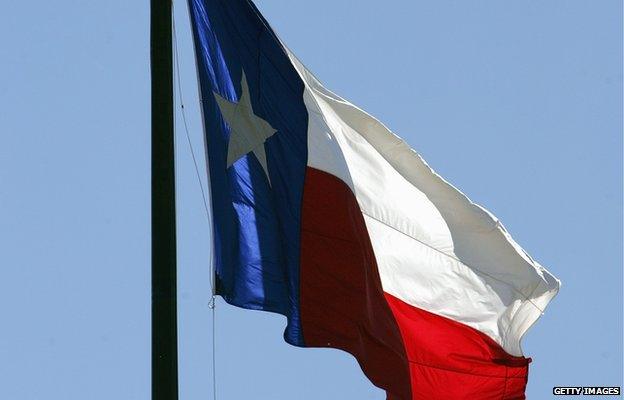
So get ready to see a lot of Texas - and Texans - over the coming months of the presidential campaign, even if it comes from places and people you don't normally associate with the state.
"It's like in Texas, there's different accents," Livingston says. "Most people don't realise that."
An East Texas accent is decidedly different than one from West Texas, she says - just like the distinct strains of Texas conservative politics.
"Obviously we have an image, we have a stereotype, and when you look at us from the outside we all look like cowboys who ride horses to work. But it also is a very, very diverse state. The Jeb Bush strain is very different from the Rand Paul strain, which is very different from Rick Perry and Ted Cruz. They all seem to wear cowboy boots, though, especially when they're in the state."
And they all want to bring their particular bit of Texas with them to the White House in 2016, boots and all.
All photos used in composites are courtesy of Getty Images
- Published5 March 2014
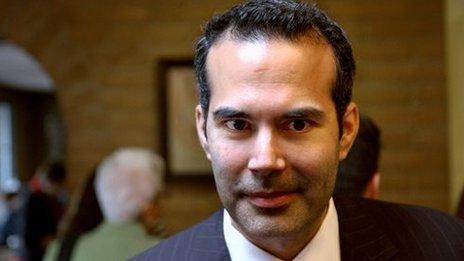
- Published1 June 2015
- Published4 June 2015
